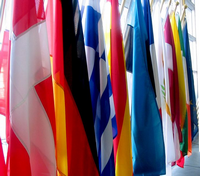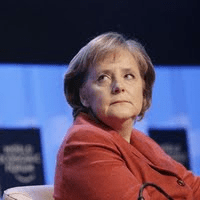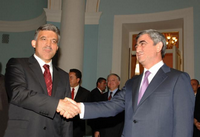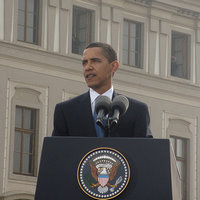If you’ve been following the saga of the EU’s foreign policy wars, you know that: 1) EU “foreign minister” Catherine Ashton has taken some heavy fire for what critics consider an underwhelming start to leading the union’s common foreign policy in the post-Lisbon era; and, 2) there’s been a barroom brawl going on behind the scenes for influence in the powers and staffing of the future European diplomatic corps, known as the EAS. So with regard to the first point, it’s interesting to read this EU Observer account of Ashton’s visibly more-assured appearance before the European Parliament to give her […]
Europe Archive
Free Newsletter
The big news on Monday regarding the Greek debt crisis was the momentum gathered over the weekend by a proposal for a European Monetary Fund for the euro zone. Initially proposed by the German finance minister, the proposal was immediately embraced by the EU commissioner for monetary affairs. Now comes the inevitable backlash, which is necessary if only to get an idea of the realistic contours such a plan might assume. The major question concerns whether such an institution would require amendments to existing treaties, with that depending on what kind of linkage it would have to actual monetary policy. […]
Greek Prime Minister George Papandreou speaks in calm, measured tones, but he is clearly determined to do what it takes to pull the debt-crushed remnants of his country’s economy out of the fire. This week he is in Washington campaigning for a unified front against the “unprincipled” financial speculators who are betting that his crisis-hit country will default on its loans. At the Brookings Institution on Monday, he called for joint a U.S.-EU “initiative in dealing with speculators.” His government has introduced draconian reforms, but progress was being undermined, he said, by “the global power of poorly regulated markets . […]

The future direction of European defense is at a crossroads. On the one hand, the NATO experience in Afghanistan has cast into stark relief the limits of European military capacities, not only at the operational but also at the political levels. On the other hand, the recently enacted Lisbon Treaty offers important new opportunities to improve European defense capabilities, especially at the institutional level. If the European Union is to establish itself as a credible security actor on the global stage, European governments will need to improve the way they work together on defense. But the biggest obstacle they face […]

Hubert Védrine was a diplomatic adviser and chief of staff to French President François Mitterand, and went on to serve as France’s foreign minister in the government of Prime Minister Lionel Jospin (1997-2002). He is the author of numerous books and articles on foreign policy and globalization, including “History Strikes Back: How Nations, States and Conflicts are Shaping the 21st Century.” In a wide-ranging interview, the edited text of which follows, he offered his analysis of the issues and challenges facing the European Union, both at home and abroad, as it enters the post-Lisbon era. World Politics Review: Let’s start […]

That which does not kill us makes us stronger. Perhaps Nietzsche’s famous words would be more apt as the European Union’s motto, instead of “Unity in Diversity,” for in the now half-century of European integration, progress has often been made through crisis. Indeed, political Europe was actually born out of a “crisis”: World War II. If the union’s current difficulties are a measure of its future progress, then progress will be great, as the current financial and economic crisis is mercilessly revealing the EU’s fundamental weaknesses: its lack of reactivity, its lack of solidarity, its lack of vision. In short, […]

President Barack Obama does not seem to care very much about Europe. A series of notable slights by the White House have led to a sense of neglect on the continent. The president skipped the commemoration of the 20th anniversary of the fall of the Berlin Wall. Adding insult to injury, while Europe was busy celebrating its remarkable unification in the wake of communism’s collapse, the White House was talking up the notion of America as a “Pacific power” and of the rise of a new G-2 grouping between the U.S. and China. Last month, the White House leaked word […]
If our European allies want to capture Barack Obama’s full attention, they could certainly do so by announcing en masse their intention to withdraw from Afghanistan by the coming July. Europe would suddenly loom large on Obama’s radar screen, triggering a flurry of diplomatic activity by the White House in a bid to prevent or at least whittle down the extent of the exodus. Obama would be in Madrid like a shot for this month’s EU-U.S. summit — from which he had previously begged off, citing commitments at home — and again for the NATO summit in April. The Europeans’ […]
I again had the pleasure last Friday of appearing on France 24’s panel discussion week-in-review program, The World This Week. The other panelists were Tom Redubrun of the IHT, Stefan de Vries of RTL, and Laura Dagg of Toute l’Europe. Topics included the Iraqi elections, the Greek debt crisis, and U.S.-Turkey relations in the aftermath of the Armenian Genocide bill. Part one can be found here. Part two can be found here.
As the push for a new round of sanctions against Iran falters, it’s becoming increasingly apparent that the Obama administration’s game plan on Iran policy was long on tactics and short on strategy. We’ve heard a bit about how U.N sanctions are up against a “bad UNSC,” which currently includes Brazil, Turkey and Lebanon as non-permanent members. But that should come as no surprise, and the same goes for those three countries’ predictable resistance to getting vocally on board for stiff sanctions. Now comes word that the administration is trying to carve out an exemption for China in unilateral U.S. […]
In EU news, the turf wars over the formation of the EU’s External Affairs Service don’t show any sign of abating. British Foreign Minister David Miliband has now been drawn into the fray, due to a letter he co-signed urging Catherine Ashton to beware the European Commission’s power grab. The letter’s tone has also been construed as further evidence of widespread disappointment with Ashton’s performance to date. Meanwhile, in addition to member states facing off against the commission, the EU Parliament has now expressed its desire for greater involvement in the EAS’ formation and orientation. None of this strikes me […]

Proposals in Brussels to throw a financial lifeline to debt-strapped Greece have met with resistance from some EU governments, in part because of the poor precedent a bailout would set for other member states in similar predicaments. But there is also mounting public opposition to such a move, particularly in Germany. As a result, despite the threat a Greek meltdown would pose to the eurozone as a whole, the German government has adopted a hard-line position in negotiations over how the EU should respond, causing relations between the two countries to become increasingly strained. The German government has historically extended […]
In answer to an inquiry from a reader, my take on the Greece crisis is that the politics vs. economics dilemma is pretty thorny for everyone involved. (See Nicolas Nagle’s WPR briefing today for a great background on that.) But the stakes are too high to let Greece or the euro fail, and so eventually, everyone is going to have to bite at least part of the bullet to seal a deal. Everything going on right now is brinksmanship, with everyone trying to get the best deal possible for their particular interests. But a neglected part of the story here […]

Demonstrating a predictable lack of strategic foresight, the U.S. Congress plans to renew its obsession with the Armenian genocide tomorrow, when the House Committee on Foreign Affairs will hold its mark-up session for the Armenian Genocide resolution. In 2007, the resolution — which “[calls] upon the president to ensure that the foreign policy of the United States reflects appropriate understanding and sensitivity concerning . . . the Armenian Genocide” — passed out of committee but never reached a vote on the House floor, following a strong pushback effort from the Bush administration. The supporters of this year’s iteration hope the […]
To the extent that Gazprom represents a Russian tool for waging politics by other means, the emerging shift in European attitudes toward the company’s Nord Stream and South Stream pipeline projects signals that when it comes to energy security, the EU has adopted an “If you can’t beat ’em, join ’em” approach. Yesterday, during Russian President Dmitry Medvedev’s visit to Paris, French energy giant GDF Suez announced it would be taking a 9 percent stake in the Nord Stream project in order to secure increased Russian deliveries from 2015. And today, the EU’s energy commissioner said that the South Stream […]
I’ve mentioned on a few occasions now the dramatic difference between European and American public opinion on the security vs. privacy balance. The latest example comes from Germany, where the constitutional court struck down a law requiring telecom companies to save customer phone and internet data for six months, due to privacy concerns. What’s interesting here is that the national law that was struck down was mandated by an EU directive that allowed for saving the data for up to 24 months. The assumption is that the U.S. gets better data-sharing deals in Europe on a bilateral level than EU-wide, […]

With the Nuclear Nonproliferation Treaty Review Conference around the corner, President Barack Obama is in dire need of a credible arms control and disarmament achievement worthy of the lofty agenda he articulated almost a year ago in Prague. Although Obama’s higher-profile disarmament goals remain out of reach for now, he could still arrive at the upcoming New York meeting with just such an achievement in hand: ridding Europe of U.S. nuclear weapons. But to do so, he will have to reject flawed and outdated arguments that stand in the way. Support for removing the 150 to 200 tactical nuclear weapons […]
